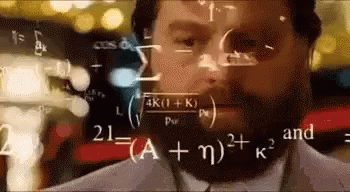"Andrew has $4.00 and spends $2.10 on a Slurpee. How much does he have left?"
That summarizes my earliest memories of money. I'm sitting at a tiny elementary school desk, pencil in hand, puzzling out the solution to a math word problem.
When we’re young, money is just math. But as we get older, it stealthily transforms into something else. Money goes from being basic arithmetic to being emotional. It becomes political. Money becomes spiritual.
And sure, occasionally, money is still math. It just doesn't feel that simple most of the time.
Have you ever tried to talk about money with a friend or a family member who holds a different approach to money than you? If it were just math, you’d whip out a couple of pencils, do a little grade-school number crunching on the back of a napkin, and then determine who got the right answer. You’d shake on it, give each other a quick pat on the back, and then keep it moving.
Instead, when differing opinions on money emerge in a friendly or familial setting, you tread lightly, knowing that both of you carry a life’s worth of complex experiences on the topic. Talking openly about money is a minefield. You can make it out unscathed, but you better be agile and light on your feet.
Money Is Complicated
The weird thing about money is that you don’t need to be a math whiz to be good at it.
But you do need to be adept at something else: knowing yourself.
Am I more of a spender or a saver? What did my parents implicitly or explicitly teach me about money? Does thinking about money evoke fear or stress in me? How often do I silently compare myself to others? Do I get defensive when talking about money with my spouse? Do I avoid talking (or thinking) about money in general?
None of that stuff is math. It’s far more complex than math.

This is math, not money. Money's harder. Sorry, math teachers.
Budgeting, planning for big purchases, talking to a friend about investments, wondering if I’m earning enough, giving enough, saving enough. The math isn’t complex - I'll share more on that in the coming weeks (shameless plug: subscribe here). It’s all the other internal, personal stuff that makes money complex.
Money Is Spiritual
Muslims know that, with intention, the ordinary can become extraordinary. We are primed to assume that everything is more complex underneath the surface. Money is most certainly more complex than its mathematical surface.
That doesn’t mean every Muslim is naturally good at money. To the contrary, I know (as I’m sure you do) a few Muslims who, by most measures, are quite bad at personal finance.
But Muslims have the intellectual traditions to help navigate the complexities of money. Academics refer to it as the "kasb genre" - texts that explore the ethical, legal, and spiritual dimensions of dealing with money. They're classical guides on how to make money in the world without getting caught up in our egos or materialism.
In his book on kasb, Imam al-Ghazali reminds us that how we earn and spend money in this world sets the stage for our life in the Hereafter.
This money thing is way bigger than math.
I’ve spent the past few months reminding myself to stop conflating money and math. I'm not just doing word problems in elementary school. I don't just bring a pencil, paper, and calculator to the discussion. It’s more complex than that.
I think I'm getting better at the math along the way, anyway.
What's Your Financial Wellness Score?
Answer a few short questions and get your personalized score in less than 5 minutes.
Written by Farooq Maseehuddin
Farooq Maseehuddin (Muslim Money Guy) is a financial educator and writer. He holds both a Bachelor of Education (BEd.) and a Master of Education (MEd.) from the University of Alberta. He's been a high school teacher and Muslim community organizer for nearly two decades.
